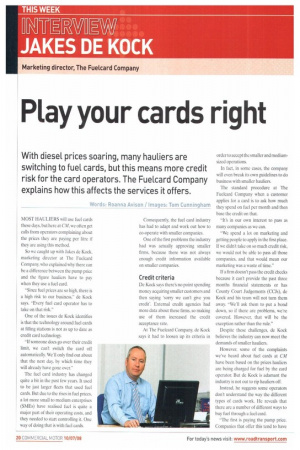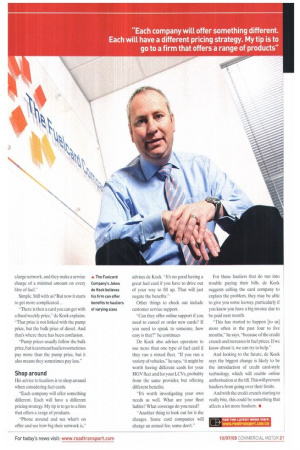Play your cards right
Page 20

Page 21

If you've noticed an error in this article please click here to report it so we can fix it.
With diesel prices soaring, many hauliers are switching to fuel cards, but this means more credit risk for the card operators. The Fuelcard Company explains how this affects the services it offers.
Words: Roanna Avison / Images: Tom Cunningham MOST HAULIERS will use fuel cards these days, but here at CM. we often get calls from operators complaining about the prices they are paying per litre if they are using this method.
So we caught up with Jakes de Kock, marketing director at The Fuelcard Company, who explained why there can be a difference between the pump price and the figure hauliers have to pay when they use a fuel card.
"Since fuel prices are so high, there is a high risk to our business,de Kock says. "Every fuel card operator has to take on that risk.
One of the issues de Kock identifies is that the technology around fuel cards at filling stations is not as up to date as credit card technology.
"If someone does go over their credit limit, we can't switch the card off automatically. We'll only find out about that the next day, by which time they will already have gone over."
The fuel card industry has changed quite a bit in the past few years. It used to be just larger fleets that used fuel cards. But due to the rises in fuel prices, a lot more small to medium enterprises (SMEs) have realised fuel is quite a major part of their operating costs, and they needed to start controlling it. One way of doing that is with fuel cards. Consequently, the fuel card industry has had to adapt and work out how to co-operate with smaller companies.
One of the first problems the industry had was actually approving smaller firms, because there was not always enough credit information available on smaller companies.
Credit criteria
De Kock says there's no point spending money acquiring smaller customers and then saying 'sorry we can't give you credit'. External credit agencies had more data about these firms, so making use of them increased the credit acceptance rate.
At The Fuelcard Company, de Kock says it had to loosen up its criteria in order to accept the smaller and mediumsized operations.
In fact, in some cases, the company will even break its own guidelines to do business with smaller hauliers.
The standard procedure at The Fuelcard Company when a customer applies for a card is to ask how much they spend on fuel per month and then base the credit on that.
"It's in our own interest to pass as many companies as we can.
"We spend a lot on marketing and getting people to apply in the first place. If we didn't take on so much credit risk, we would not be able to pass all those companies, and that would mean our marketing was a waste of time."
If a firm doesn't pass the credit checks because it can't provide the past three months financial statements or has County Court Judgements (CCJs), de Kock and his team will not turn them away. "We'll ask them to put a bond down, so if there are problems, we're covered. However, that will be the exception rather than the rule."
Despite these challenges, de Kock believes the industry can now meet the demands of smaller hauliers.
However, some of the complaints we've heard about fuel cards at CM have been based on the prices hauliers are being charged for fuel by the card operator. But de Kock is adamant the industry is not out to rip hauliers off.
Instead, he suggests some operators don't understand the way the different types of cards work. He reveals that there are a number of different ways to buy fuel through a fuel card.
"The first is paying the pump price. Companies that offer this tend to have a large network, and they make a service charge of a minimal amount on every litre of fuel."
Simple. Still with us? But now it starts to get more complicated...
"There is then a card you can get with a fixed weekly price,de Kock explains. "That price is not linked with the pump price, but the bulk price of diesel. And that's where there has been confusion.
"Pump prices usually follow the bulk price,but it canmean haulierssometimes pay more than the pump price, but it also means they sometimes pay less."
Shop around
His advice to hauliers is to shop around when considering fuel cards.
"Each company will offer something different. Each will have a different pricing strategy. My tip is to go to a firm that offers a range of products.
"Phone around and see what's on offer and see how big their network is," advises de Kock. "It's no good having a great fuel card if you have to drive out of your way to fill up. That will just negate the benefits."
Other things to check out include customer service support.
"Can they offer online support if you need to cancel or order new cards? If you need to speak to someone, how easy is that?" he continues
De Kock also advises operators to use more than one type of fuel card if they run a mixed fleet. "If you run a variety of vehicles," he says, "it might be worth having different cards for your HGV fleet and for your LCVs, probably from the same provider, but offering different benefits.
"It's worth investigating your own needs as well. What are your fleet habits? What coverage do you need?
"Another thing to look out for is the charges. Some card companies will charge an annual fee, some don't." For those hauliers that do run into trouble paying their bills, de Kock suggests calling the card company to explain the problem, they may be able to give you some leeway, particularly if you know you have a big invoice due to be paid next month.
"This has started to happen [to us] more often in the past four to five months," he says, "because of the credit crunch and increases in fuel prices. If we know about it, we can try to help."
And looking to the future, de Kock says the biggest change is likely to be the introduction of credit card-style technology, which will enable online authorisation at the till, This will prevent hauliers from going over their limits.
And with the credit crunch starting to really bite, this could be something that affects a lot more hauliers. •








































































































































































